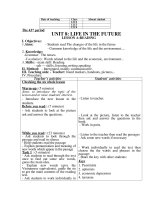Unit 8. Life in the future
Bạn đang xem bản rút gọn của tài liệu. Xem và tải ngay bản đầy đủ của tài liệu tại đây (1.67 MB, 24 trang )
Our lives in the future
Construction/
transportation
housework
health
music
servicehousing
I. Pronunciation
Contracted forms of auxiliaries
Full forms
I have
You have
He has
She has
It has
Contracted
forms
I’ve
You’ve
He’s
She’s
It’s
Full forms
I have not
You have not
He has not
She has not
It has not
Contracted
forms
I haven’t
You haven’t
He hasn’t
She hasn’t
It hasn’t
I’ve got something for you.
You’ve got something for me?
We’ve failed and they’ve passed.
I haven’t always lived in this cottage you
know.
Haven’t you? You’ve not been here long, of
course.
I haven’t. but I’ve grown to love it already.
He’s left, and she’s gone to work, too.
Hasn’t the doctor come yet?
No. The doctor hasn’t been called.
II. Grammar Prepositions and articles
1. Prepositions.
a. Prepositions of time: at, on, in
Ex: at 10:30,
at 5:00 o’clock
“at” is used with:
at night, at noon….
at the moment, at that time
at the same time
at the end of……
“on” is used before days
Ex:
On Monday
On Tuesday
On Wednesday
….
“on” is also used with:
Ex:
On 10th October
On Easter day
On new year day
On time….
We use “in” before months, years, century…
Ex: in January, in February, in March….
in1999, in 2008…
in 21st century……
“in” is also used with:
Ex: in the day, in the morning, in time,
in summer,
in the past….
b. Prepositions of places:
The cat is on the case
The cat is behind the case
The cat is next to the case
The cat is in the case
The cat is under the case
b. Prepositions of places:
The birds are on the tree
The birds are under the tree
The dog is running behind the cat
b. Prepositions of places:
The bird flies over the tree
elephant
is standing
near the
TheThe
elephant
is standing
between
thetree
trees
Prepositions are used with some verbs
Believe in
warn about
insist on
consist of
prevent from
congratulate on
look after
die of
apologize for
look forward to
think of/about
make of/from….
Prepositions are used with some
adjectives.
interested in
tired of
successful in
different from
famous for…
afraid of
ashamed of
similar to
good at
Exercise1:Choosing the appropriate
prepositions.
1. Luckily, you are ….. time for the meeting.
A. in
B. on
C. at
2. Many people are dying …..various types of
cancer.
A. on
B. by
C. of
3. I will not be here next week. I am going
……..business in Mexico.
A. in
B. on
C. of
4. ….the end of the book, they get married and
live happily ever after.
A. At
B. In
C. On
5. Thank you for everything you’ve done. You are
a true friend ….me.
A. of
B. to
C. in
6. I can’t believe… you. You always let me down.
A. in
B. to
C. at
7. I have warned you …. the difficulties you have
to face when applying for the job.
A. on
B. about
C. to
8. Britney Spears is famous…….. her beautiful
face and sweet voice.
A. by
B. for
C. of
9. The bookshop is…….. the chemist’s and the
butcher’s and ……….…the library.
A. among/opposite B. between/ across
C. between/opposite
10. Next year, I’m going to get married…. John
and we are going to move to Bristol.
A. to
B. with
C. for
2. The articles.
Indefinite articles and definite articles.
Look at the following sentence and compare the
use of a, an and the:
An old man and a young girl are sitting
opposite me. The old man is French and the
young girl is English.
Yesterday I bought an English book and a
literature book. The English book is interesting
but the literature one is boring
=> An indefinite article (English a, an) is
used before singular nouns that refer to any
member of a group.
+ A is used before nouns beginning a
consonant.
Example:
a bird
a computer
+ An is used before nouns beginning with a
vowel sound.
Example:
An apple
An old man
An orange An umbrella
A university
An honest man
=> A definite article (English the) is used
before singular and plural nouns that refer to a
particular member of a group.
The cat is on the red mat.
Yesterday, I bought a book. The book is very
interesting.
“The” is used in double comparative:
The more you learn, the more you know.
“The” is used with an adjective:
The rich = the rich people
Exercise2: Put a/an, the or Ø in each space to
complete the following sentences.
Ø
1. We went by ……train
to the west of England.
Ø
2. …….people
who live in…….Scotland
Ø
are
Ø
called…...Scots.
the
3. Columbus was one of ……first
people to
the
cross…...Atlantic.
the
4. Davis learn to play…….violin
when he was at
Ø
…..university.
the
Ø
5. Did you read ……book
I lent you …….last
week?
the
Ø
6. Is that …..present
Bill gave you for …….
Christmas?
Ø our life
7. The
…...computer has already changed……
dramatically.
an
the
8. There was …..accident
yesterday at …….
the
corner of ……streets.
Ø
the
9. I need …….time
to thank for…….offer
you
gave me.
Ø
a
10. ……little
knowledge is ……dangerous
thing.
• Prepare Test yourself C









